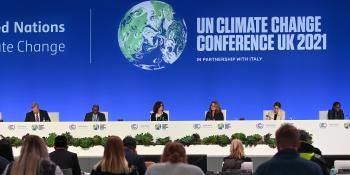Changing gender roles in Nepal could increase agricultural emissions

In an effort to feed its growing population under a changing climate, Nepal is trying to intensify its agricultural production. As an effect, traditional gender roles within agriculture are slowly starting to change, with women becoming increasingly involved in important farm decisions. A new Working Paper is investigating if these changes could also have an impact on agricultural greenhouse gas emissions.
The recently released Working Paper “Gender roles and greenhouse gas emissions in intensified agricultural systems in the mid-hills of Nepal” suggests that women’s increased involvement in decision-making activities and application of fertilisers could in fact lead to an increase in nitrous oxide (N2O) emissions. Taking this into consideration Nepal has to take acton to curb this negative spiral of increased agricultural emissions, the Working Paper concludes.
Learn more about fertilisers: What’s the verdict on chemical fertilisers?
As in many other low-income countries, Nepal’s men and women farmers have specific roles when it come to agricultural practices. Women tend to manage the ‘land preparations’, such as cutting and removal of vegetation and incorporation of crop residues. The men then take over, ploughing the land. Sometimes women do plough themselves, normally by using a hand-hoe.
After ploughing women’s role is then to break up the soil clods and carrying farmyard manure. Pesticide applications still rely with the men as it is a heavy task and could cause health issues for pregnant women.
Changing roles in society between men and women and the increasing intensification of agriculture have however led to more women taking part in decision-making, such as purchasing and applying fertilisers for example. More crops per year are also being produced in an effort to reduce food insecurity and increase revenues. This in turn pushes the use of fertilisers and pesticides.

A growing population and lack of land require Nepal to intensify its agriculture. This together with changing gender roles in society might come at a cost of increasing GHG emissions. Photo: N. Palmer (CIAT)
The Working Paper suggest that in order to ensure food for everyone in the upcoming years – in a sustainable way - more information and interventions targeting women are key.
Educating women, and men, about the negative aspects of increasing fertilisers in an unregulated manner could help improve the sustainability of ongoing agricultural intensification, the authors hope. However, offering training activities that are sensitive to women’s household responsibilities will be necessary, as during the research study women argued that trainings that kept them away from the family were not ideal.
Sustainable management of chemical fertilisers is pivotal. This as increases in GHG could contribute further to climate change. Usage needs to be addressed through activities that improve the overall management of fertilisers and manure, for instance through targeted application.
Read more about gender roles linked to agricultural development in the Working Paper: “Gender roles and greenhouse gas emissions in intensified agricultural systems in the mid-hills of Nepal”, by Raut, N, Raya, Sitaula, B K, Bajracharya, R M, Kristjanson, P, 2013. Working Paper No. 47
You can learn more about Nepal's efforts to combat climate change in our related blog post: New paper outlines Nepal's efforts to combat climate change effects
Cecilia Schubert works as a Communications Assistant at the CCAFS Coordinating Unit. Follow us on Twitter: @Cgiarclimate and Facebook.



